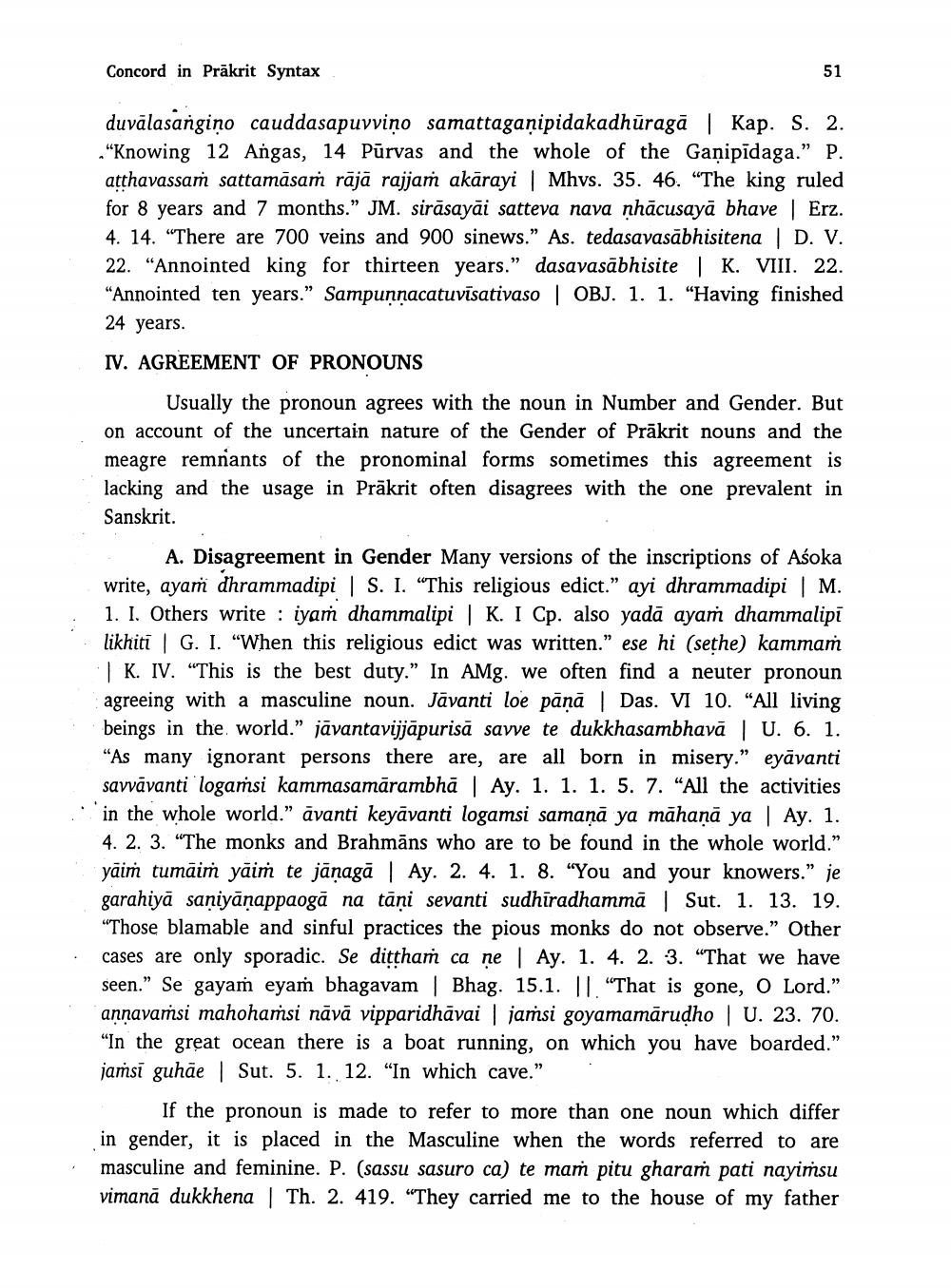________________
Concord in Prākrit Syntax
duvālasangiņo cauddasapuvviņo samattaganipidakadhūragā | Kap. S. 2. “Knowing 12 Angas, 14 Pūrvas and the whole of the Ganipidaga." P. atthavassaṁ sattamāsas rājā rajjam akārayi | Mhvs. 35. 46. "The king ruled for 8 years and 7 months.” JM. sirāsayāi satteva nava nhācusayā bhave Erz. 4. 14. "There are 700 veins and 900 sinews." As. tedasavasābhisitena | D. V. 22. "Annointed king for thirteen years." dasavasābhisite | K. VIII. 22. "Annointed ten years.” Sampunnacatuvīsativaso OBJ. 1. 1. "Having finished 24 years. IV. AGREEMENT OF PRONOUNS
Usually the pronoun agrees with the noun in Number and Gender. But on account of the uncertain nature of the Gender of Prākrit nouns and the meagre remnants of the pronominal forms sometimes this agreement is lacking and the usage in Prākrit often disagrees with the one prevalent in Sanskrit.
A. Disagreement in Gender Many versions of the inscriptions of Asoka write, ayam dhrammadipi | S. I. "This religious edict." ayi dhrammadipiM . 1. I. Others write : iyam dhammalipi | K. I Cp. also yadā ayam dhammalipi likhiti G. I. "When this religious edict was written.” ese hi (sethe) kammam | K. IV. “This is the best duty." In AMg. we often find a neuter pronoun agreeing with a masculine noun. Jāvanti loe pānā | Das. VI 10. "All living beings in the world." jāvantavijjāpurisā savve te dukkhasambhavā U. 6. 1. "As many ignorant persons there are, are all born in misery." eyāvanti savvāvanti logamsi kammasamārambhā | Ay. 1. 1. 1. 5. 7. "All the activities in the whole world." āvanti keyāvanti logamsi samaņā ya māhaņā ya | Ay. 1. 4. 2. 3. "The monks and Brahmāns who are to be found in the whole world." yaim tumāim yāim te jānagā | Ay. 2. 4. 1. 8. "You and your knowers." je garahiya saniyānappaoga na tāni sevanti sudhiradhammā | Sut. 1. 13. 19. "Those blamable and sinful practices the pious monks do not observe." Other cases are only sporadic. Se dittham ca ne | Ay. 1. 4. 2. 3. "That we have seen.” Se gayaṁ eyam bhagavam | Bhag. 15.1. 11. "That is gone, O Lord.” annavamsi mahohamsi nāvā vipparidhāvai | jaṁsi goyamamārudho | U. 23. 70. "In the great ocean there is a boat running, on which you have boarded." jassi guhāe | Sut. 5. 1. 12. "In which cave."
If the pronoun is made to refer to more than one noun which differ in gender, it is placed in the Masculine when the words referred to are masculine and feminine. P. (sassu sasuro ca) te maṁ pitu gharaṁ pati nayiṁsu vimanā dukkhena Th. 2. 419. “They carried me to the house of my father




